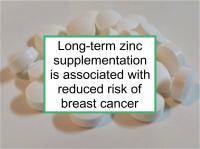A new study has reported that supplementation with zinc for at least 10 years is associated with reduced risk of breast cancer. The study was designed to investigate the associations between antioxidant intake and risk of breast cancer. The influence of antioxidants on breast cancer remains controversial.
The study included 2,362 women with breast cancer (866 premenopausal and 1,496 postmenopausal cases) and 2,462 cancer-free controls. Participants provided data regarding their intake of antioxidants from diet and supplements, as well as information concerning other potential breast cancer risk factors, by means of a self-administered questionnaire.
Compared with participants who did not take any supplements, participants with 10 years or longer of supplementation of zinc were found to have less than half the risk of premenopausal breast cancer and postmenopausal breast cancer. Supplementation of 10 years or longer of beta-carotene, multivitamins, vitamin E and vitamin C were also associated with somewhat lower postmenopausal breast cancer risk. No significant associations with breast cancer risk were found for antioxidants from dietary sources (including beta-carotene, alpha-carotene, lycopene, lutein and zeaxanthin, vitamin E, vitamin C, selenium and zinc) or from supplementation of less than 10 years in duration. The authors conclude that supplementation of zinc in premenopausal women, and supplementation of multivitamins, beta-carotene, vitamin C, vitamin E and zinc in postmenopausal women for 10 or more years may protect women from developing breast cancer. The authors comment, however, that they were unable to determine the overall effect of total intake from both diet and supplements.
Comments regarding the study
As the authors note, the relationship between taking vitamin and mineral supplements and risk of breast cancer is controversial because study results have been inconsistent (see the study summaries below). This is also true of zinc. Zinc has for the most part been associated with lower risk of breast cancer. One study found that circulating levels of copper and the copper/zinc ratio were significantly higher in breast cancer patients compared to controls, suggesting that zinc might mitigate the cancer-promoting effects of too much copper. However, another study found that relatively high levels of zinc, iron, and calcium in benign breast tissue may be related to a modest increase in the risk of breast cancer. Both of these studies, and others, point to interactions between zinc and other minerals in influencing breast cancer risk, interactions which are not well understood. Women taking zinc are in all likelihood taking it as part of a multivitamin with minerals or with other supplements. While the authors used statistical methods to separate the effects of various vitamins and minerals on breast cancer risk, it is possible that the overall results concerning zinc disguise some combinations of supplements with zinc or levels of zinc that are harmful.
The fact that the reduction in risk of breast cancer was observed only after 10 years of zinc supplementation is notable. There are several possible explanations, one of which is that zinc might help prevent breast cancer while facilitating the growth of any existing tumors. What is the bottom line for breast cancer patients and survivors? It appears inadvisable for breast cancer patients undergoing radiotherapy or chemotherapy to take multivitamins or zinc because these supplements may help protect cancer cells from cell death, thereby reducing the treatment effectiveness (this conclusion is based on a theory that appears plausible given available evidence but has not been proven). Given study results to date, the best advice we can offer for survivors is to be tested for possible vitamin and mineral deficiencies and make dietary adjustments and take supplements to address any proven deficiencies.
